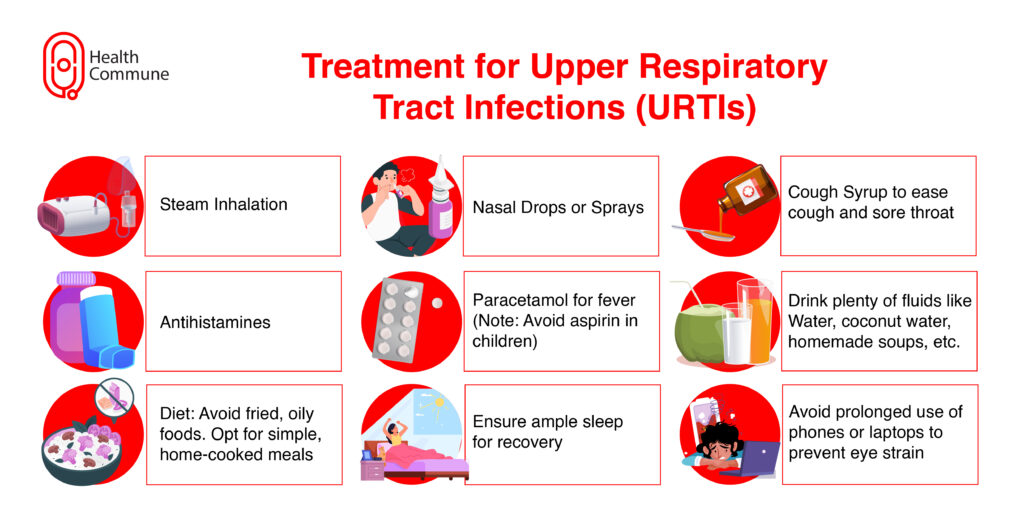Upper respiratory tract infections are one of the most common infections known to mankind. Let’s find out more about how they’re caused, their treatment, complications, and how you can prevent them.
What is an upper respiratory tract infection?
An upper respiratory infection (URI) or upper respiratory tract infection (URTI) is an infection affecting the upper part of your respiratory tract. This includes your nose, throat, sinuses, pharynx, larynx, and large airways.
This category includes the following set of conditions:
- Common cold
- Epiglottitis
- Pharyngitis
- Laryngitis
- Sinusitis
What causes an upper respiratory tract infection?

How do upper respiratory tract infections differ from lower respiratory tract infections?
While your upper respiratory tract extends from your nose to your large airways, the lower respiratory tract includes the trachea and lungs (airways like the bronchi and bronchioles, and sac-like structures called alveoli). Lower respiratory tract infections are usually more severe, don’t go away on their own, and require medical attention.
Who’s at risk for developing an upper respiratory tract infection (URTI)?
Anyone can get a URTI. The following groups are more vulnerable:
- Children
- Those suffering from asthma or allergies
- People who smoke regularly
- People with a weakened immune system such as transplant patients, people on regular corticosteroids, people living with HIV, etc.
What is the typical duration of an upper respiratory tract infection?
How does an upper respiratory tract infection commonly present?
The most common symptoms of an URTI include:
- Cough
- Sore throat
- Hoarse voice
- Headache
- Fever
- Nasal congestion and a runny nose
- Ear pain
- Loss of appetite
- Generalised fatigue or malaise
How is an upper respiratory tract infection diagnosed?
Your doctor will examine your chest and back with a stethoscope to determine if your airways are clear and to rule out any lower respiratory infections. They’ll also examine your throat and ears to pinpoint the cause. In case your doctor suspects something more serious, they will recommend:
- X-ray
- RT-PCR, or rapid antigen testing, in the case of suspected COVID-19 infections
- CB-NAAT (Cartridge-based Nucleic Acid Amplification Test): If you have had a persistent cough for more than 2 weeks, your doctor will advise you to get yourself tested for TB (tuberculosis). You’ll be required to give a sample of your sputum for this
What’s the treatment for upper respiratory tract infections?
URTIs usually resolve on their own. Some home remedies include:
- Do steam inhalation 2-3 times a day to relieve nasal congestion
- Use over the counter nasal drops or sprays
- Use an over-the-counter cough syrup to ease your cough and sore throat
- Use antihistamines to get relief from your symptoms
- In cases of fever, you can take paracetamol. (Note: Never give your child aspirin)
Keep yourself well-hydrated by drinking plenty of fluids such as water, coconut water, homemade soups, etc. - Avoid fried, oily foods. Eat simple, home-cooked meals instead.
- Get plenty of sleep
- Avoid staring at your phone or laptop for long periods of time to ensure you don’t strain your eyes
Do I need antibiotics for upper respiratory tract infections?
Since most of these infections are caused by viruses, antibiotics are not effective in tackling them. Don’t take antibiotics unless specifically prescribed by your doctor (that is, if they suspect a bacterial infection).
What are the complications of upper respiratory tract infections?
Sometimes, these can progress to a lower respiratory tract infection. A few complications include:
- Bronchitis
- Pneumonia
- Spread of infections to the ears, leading to middle ear infections
- Respiratory insufficiency
- In rare cases, the infection can spread to your brain or heart and cause severe damage
When should I go to a doctor for an upper respiratory tract infection?
Visit your doctor if you’re having:
- Difficulty breathing
- High fever in spite of taking medicines
- Severe cough and chest pain
- Symptoms that have lasted beyond 2 weeks
How can I protect myself from upper respiratory tract infections?
You can follow simple hygiene measures to protect yourself and others around you. These include:
- Washing your hands regularly
- Covering your mouth while coughing or sneezing
- Wiping down any surfaces you’ve touched to avoid the spread of infection
- Avoid sharing plates and spoons with others when you’re sick
- Staying at home to prevent the spread of infection
- Ensuring your child stays at home until they recover




